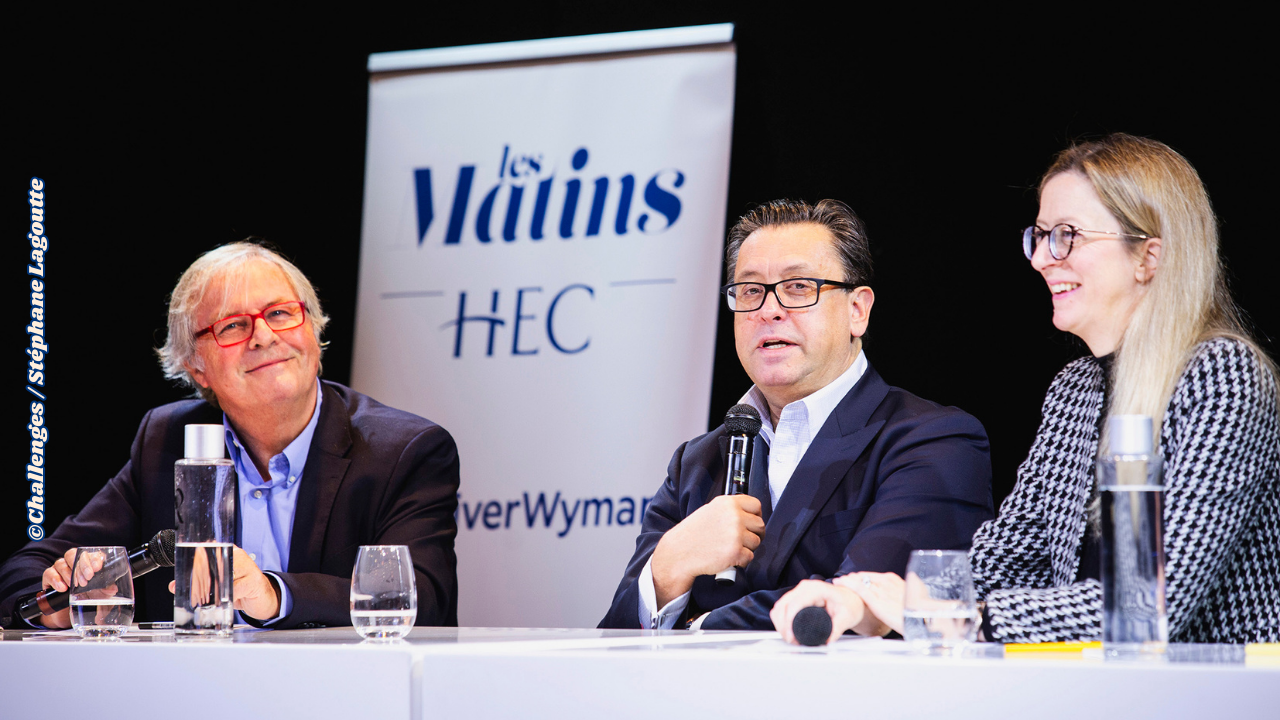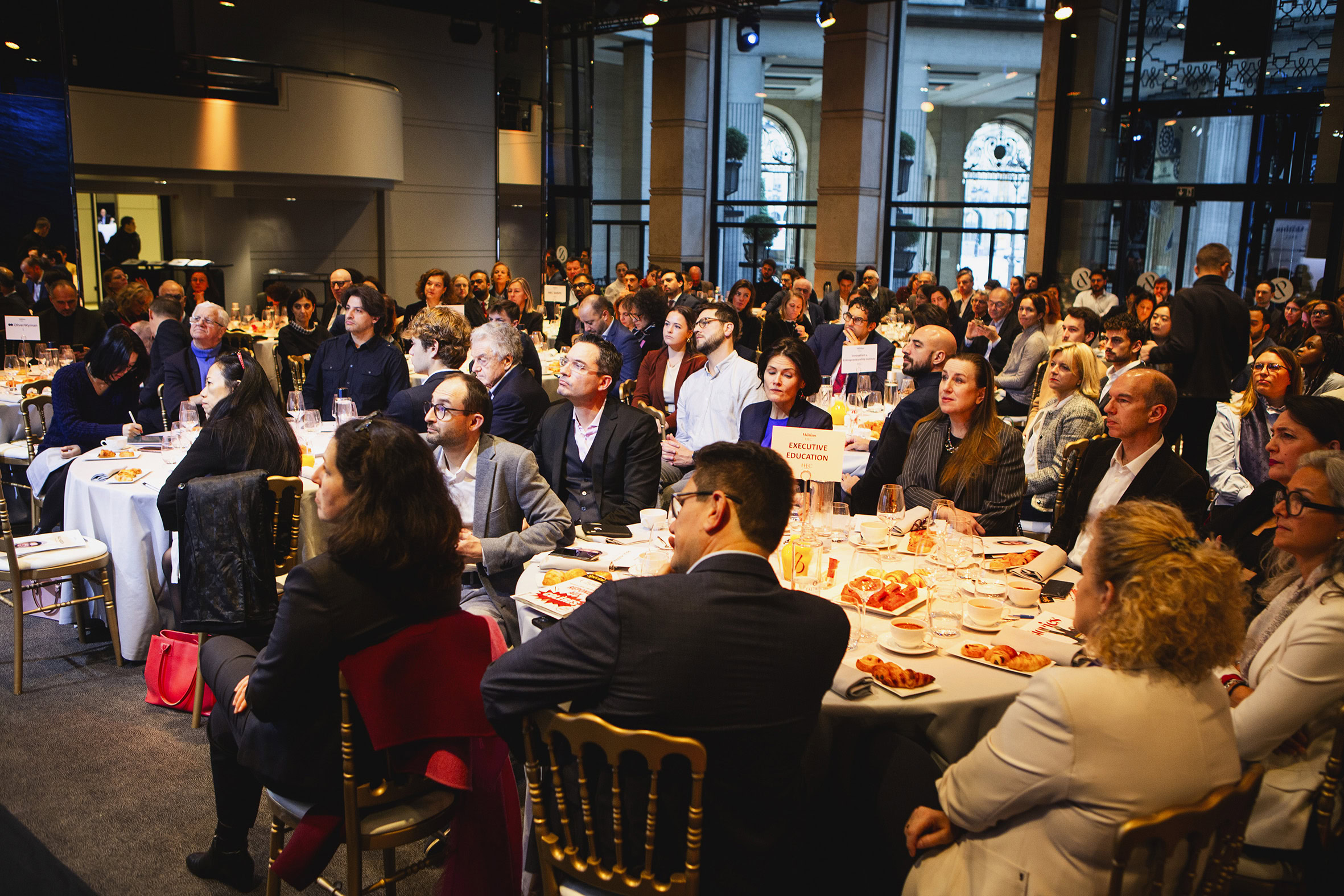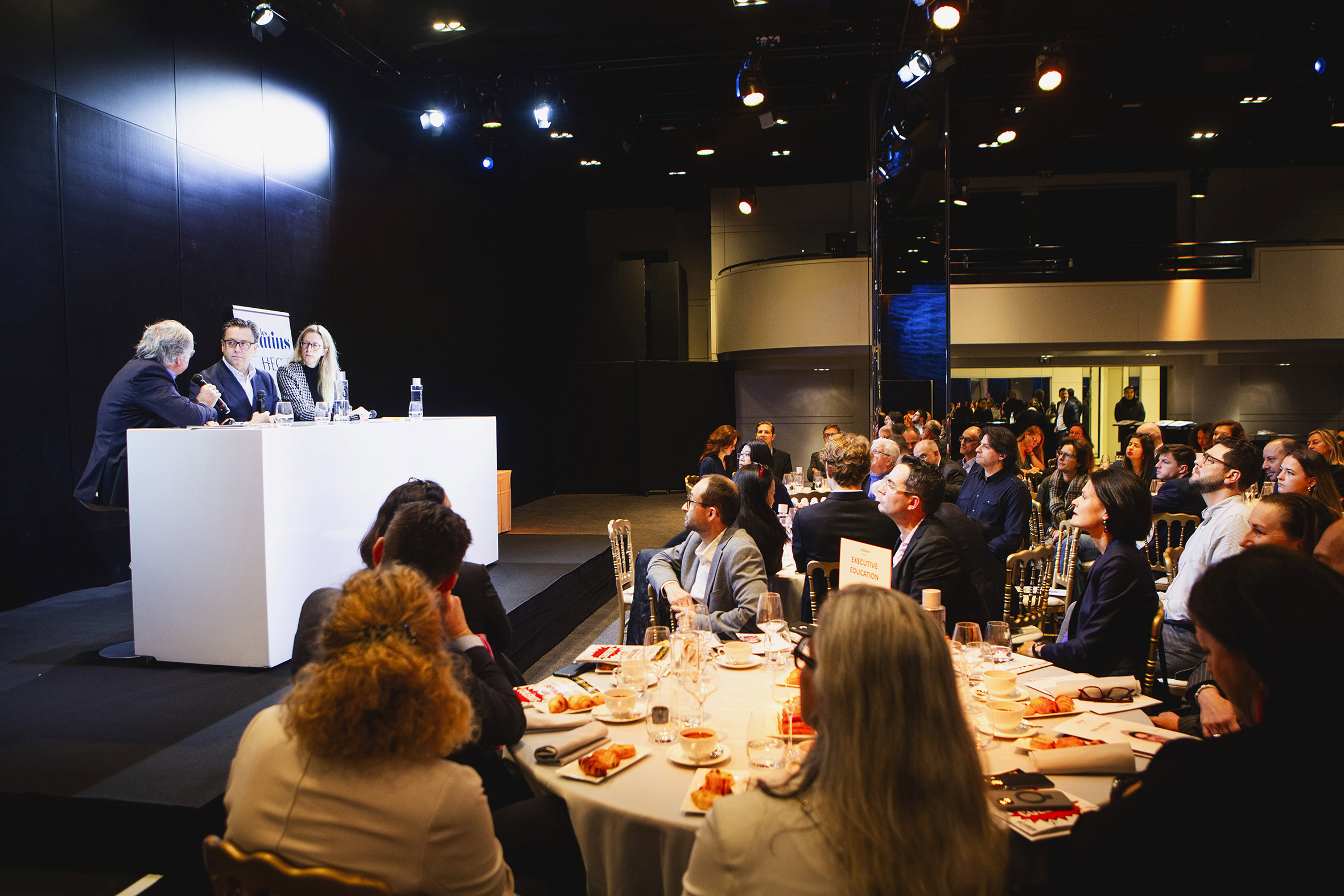An “Matin HEC” with Paul Hudson, CEO of Sanofi

Paul Hudson was the 341st guest of Les Matins HEC last Friday, a flagship event for the community where a prominent figure from the business world addresses an audience of alumni. With a touch of British humor and a conversational rather than academic tone, Sanofi’s CEO enthusiastically discussed the challenges facing his biopharmaceutical group.
It seems the freezing temperatures did not deter the audience. Inside the Pavillon Vendôme on this final Friday of November, no fewer than 150 alumni eagerly awaited Paul Hudson, croissant in one hand and orange juice in the other. The community was notably well-represented, with members from the Entrepreneurship & Innovation Institute (IEI), the HEC Healthcare group, as well as Indian and American graduates keen to hear from the British CEO. After a presentation of the guest led by Hortense de Roux (H.05), the new president of HEC Alumni, and an analysis by expert Bruno Despujol, partner at Oliver Wyman and head of the Paris and Brussels offices, Vincent Beaufils (H.75), the editor-in-chief of Challenges magazine, took on the role of interviewer.
And he did not hold back, kicking off the discussion with a pointed question about the sale of Opella, Sanofi’s consumer healthcare subsidiary and parent company of Doliprane, a product so beloved by the French. “Now that is starting with a bang!” Hudson quipped before explaining his decision, highlighting the need for significant investments to compete with Haleon and Kenvue, and his preference to focus on developing innovative treatments for under-addressed diseases. While acknowledging that Doliprane represents “a small share of revenue (€200 million out of over €5 billion in annual consumer healthcare revenues) but a large share of emotion,” the former Novartis executive assured the audience that the pain reliever would remain “manufactured in France for France.” He also emphasized that he had selected a private equity fund that he believes will generate the greatest value for patients, the subsidiary, and investors alike.

© Challenges / Stéphane Lagoutte
Asked about the vaccine factory in Neuville-sur-Saône (Rhône), inaugurated in September by Emmanuel Macron, Paul Hudson seized the opportunity to recount the origins of the project. He shared a promise he made to the French president in 2020: “After admitting to him that we would struggle to develop an mRNA COVID-19 vaccine, I committed to providing the largest vaccine factory on the planet in case such a situation arose again.” Following more than five years of construction, this nearly entirely mobile and modular production site will, by late 2025, have the capacity to manufacture up to four vaccines simultaneously. “France will thus have a unique complex in Europe, perhaps even the world, to protect not only its citizens but also all Europeans,” he concluded proudly.
When asked to highlight the greatest change of recent years, Paul Hudson did not hesitate: for him, it is artificial intelligence. “Imagine this: today, developing a drug costs us €3 billion and comes with a 35% risk of failure. With generative AI, we can drastically reduce both figures and increase our chances of finding the miracle cure!” Referencing the movie Terminator, where machines surpass humans, the British CEO stressed the importance of viewing AI as an opportunity rather than a threat. He detailed two current applications of AI within Sanofi: expert AI, where specialists use supercomputers to design drugs for treating incurable diseases, and “snackable AI”, or “quick-consumable AI.” This allows, through an app, to make a wide range of company data accessible to everyone, enabling employees to make faster and more informed decisions. “This approach works across the entire company, and no one can compete with us in this area. We’re the only ones doing it at this level,” Hudson boasted. Already 18,000 employees use this application internally.
Challenged by Vincent Beaufils about Sanofi’s stagnant stock price since his arrival, Hudson appeared optimistic about future growth, emphasizing the importance of dedicating the company’s drug pipeline to innovation. “In our industry, it takes 5 to 7 years to reboot a pipeline, so we just need a little more patience. But we already have a promising indicator: employee engagement has never been higher.”
Pressed again on the company’s potential reliance on Dupixent, which accounts for 30% of Sanofi’s revenue, the CEO unveiled a bold €10 billion plan through 2030 to identify a successor. “The idea is to anticipate the end of intellectual property rights in the mid-2030s and reassure the market,” he explained, noting that the lab’s researchers had already pinpointed three potential blockbuster drugs from the pipeline. Among them is the much-anticipated Tolebrutinib, the first drug designed to combat multiple sclerosis.
Finally, Hudson navigated a tricky question about the French healthcare system by highlighting France’s superior access to innovation compared to most other European countries (15% of its healthcare budget is devoted to it). He also praised French universities for producing some of the world’s brightest minds, while lamenting that the most significant scientific publications are still dominated by the United States and China.
As a football fan, like any self-respecting Englishman, Hudson ended the event on a humorous note: his real regret, he joked, is Manchester United’s shaky start to the season—though, he quipped, “not as calamitous as that of our national idol, Kylian Mbappé!”

© Challenges / Stéphane Lagoutte
Published by La rédaction

